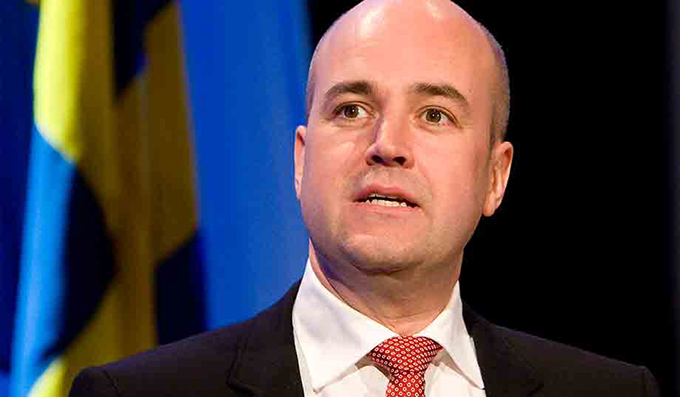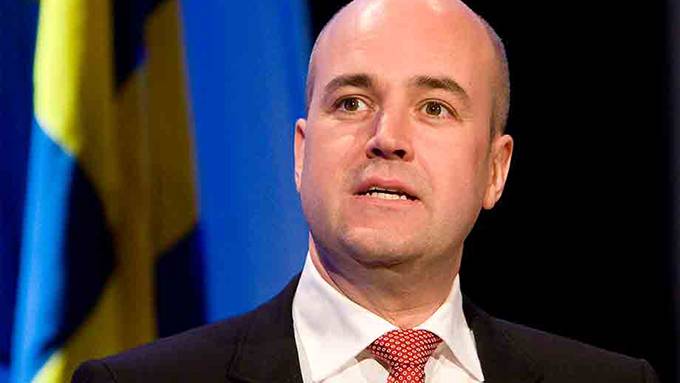Swedish Surprise: Anti-Immigration Party Surges...
Source: nationalreview.com

Swedish prime minister Fredrik Reinfeldt
Sunday’s election in Sweden was supposed to be a cakewalk for the Left. The Drudge Report ran a piece yesterday from the Guardian entitled: “Free-market era in Sweden swept away as feminists and greens plot new path.” The paper, a left-wing British outlet, published the piece the day before the election; it proved to be, well, premature.
Sweden’s three leading left-wing parties did win about 44 percent of the vote, outpolling the ruling conservative four-party coalition’s 39 percent. But the balance of power may rest in the hands of the nationalist, immigration hard-line Sweden Democrats, who won 13 percent — a full seven points higher than their 2010 showing. Swedish television reports that one out of three voters who backed the Sweden Democrats in this election voted for the Moderates, the largest conservative party, back in 2010. On the left, the new Feminist Initiative party stole votes from the left but ended up falling short of the 4 percent required to earn seats in parliament. The Green party actually lost seats.
When a Swedish coalition led by the Left is cobbled together, will the country once again become the classic cradle-to-grave welfare state that U.S. leftists used to swoon over? Hardly, and many of the free-market reforms Sweden pioneered in Europe are likely to stay.
Sweden has clearly changed in the last 20 years under the governance of parties of both the Left and the Right. In the 1990s, the public sector grabbed 68 percent of the country’s gross domestic product. Today it is on track to account for 50 percent of GDP, because economic growth has dramatically outstripped the growth of government spending, which has increased at an annual rate of only 1.9 percent over the last decade. Sweden scrapped inheritance taxes, wealth taxes, and most property taxes. It cut income taxes and corporate taxes, and, as a result, disposable income has risen by almost 20 percent in the last eight years of the ruling conservative coalition.
But the very success of the coalition’s economic policy evidently led some voters to think that they could take the risk of returning the Social Democrats, who have ruled the country for 64 of the last 80 years, to power. Conservative prime minister Fredrik Reinfeldt has had trouble explaining the stubbornly high unemployment rate of 8 percent — and an even higher rate among the young and immigrants.
Jimmie Akesson, the leader of the Sweden Democrats, has a simple explanation for the lack of jobs. “If you allow more asylum seekers into the country than the number of jobs you can create, the result is obvious,” he said in a recent speech. Sweden expects more than 90,000 asylum seekers this year, a huge number in a county of only 10 million people. According to the United Nations, Sweden received the most asylum applications per person in the world from 2009 through 2013. The share of Swedes born abroad was 16 percent last year compared with 11 percent in 2000. Akesson calls for cutting back on asylum acceptances, requiring immigrants to pass language tests, and trimming immigrants’ welfare benefits.
“The Sweden Democrats is the only political party that wants to stop immigration,” Anders Sannerstedt, a political scientist at Lund University, told the French news agency AFP. “All the other political parties have a united stance, a generous immigration policy.”
That pro-immigration stance was exemplified by Prime Minister Reinfeldt in an August 16 speech. “I’m now pleading with the Swedish people to have patience, to open your hearts, to see people in high distress whose lives are being threatened,” he said. “Show them that openness, show them tolerance.”
Reinfeldt’s immigration stance clearly cost his Moderate party votes this year. Its share of the vote fell from 30 percent in its successful reelection of 2010 down to just 22 percent this year. In contrast, the anti-immigration Sweden Democrats more than doubled their showing from 2010, becoming the third-largest party after the Social Democrats and the Moderates. A majority of Swedes voted for non-Left parties in Sunday’s election, but the absolute refusal of any of these parties to negotiate with Sweden Democrats dooms them to remain in the opposition.
Part of the conservative coalition’s economic agenda probably did repel some voters and drive them to left-wing parties. And the government’s aggressive moves to expand private involvement in health care and education — the government expanded privately run schools, for instance, such that 20 percent of pupils are now enrolled in them — did create a backlash. One school company went bankrupt this year, and another served students crispbread and water for lunch; left-wing newspapers capitalized on these scandals to undermine support for privatization. Critics have contended that sending more and more students to privately run schools has led to lowered test results overall, but these fears are unfounded. The Program for International Student Assessment completed a report on schools in Sweden in February 2014; one of the report’s finding was that “the percentage of students enrolled in private schools is not related to a system’s overall performance.”
If there is a new left-wing government in Sweden, it might rein in private provision of services such as education and health care, but few observers believe that economic policy will change significantly. Magdalena Andersson, the likely finance minister under any Social Democratic government, “is moderate to a fault,” The Economist wrote. “She has no plans to challenge the monetary-policy independence of the Riksbank [central bank]. As for fiscal policy, she wants to raise a few taxes, including Value Added Tax and the top marginal rate, but nothing like as high as the Social Democrats of old. She has no complaints about the overall state of the public finances. Indeed, she wants to move into budget surplus faster.”
So regardless of the final vote counts in Sweden’s recent election, and no matter who makes up the governing coalition, it looks as if the country will preserve many free-market reforms. The situation is reminiscent of what happened in Britain in 1997, when the Labour party’s Tony Blair ousted the Conservatives after 18 years in opposition. Far from overturning the economic agenda of Margaret Thatcher, Blair broadly accepted it and proceeded to move left on social policy and immigration. Those moves damaged Britain even while its economy grew. The same thing could happen in Sweden. Conservatives appear to have won the broad economic argument in many countries, but the culture wars are a different matter entirely.
Source: nationalreview.com






















